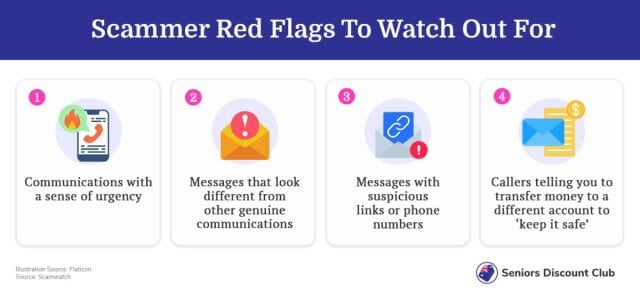Aussie couple loses almost $50,000 to a bank scam
By
Seia Ibanez
- Replies 12
It's no secret that scammers are coming up with new and creative ways to steal from victims, which is why it's so important to always be alert and up to date with the latest scams coming up.
This distressing story experienced by a couple is a wake-up call for others to remain vigilant against the ever-present threat of scams.
Jo and Rohan had been saving their hard-earned cash for five years, looking to save enough money for a deposit on their first house.
Early this November, their nightmare began.
Jo received a phone call from an unknown number with a British accent. The man claimed to be working for the bank’s fraud team.
He said that there was an unusual transaction of $14,000 made from her bank account.
‘He was very convincing. He knew my name, my number, my transaction limit–information that only the bank would know,’ Jo said.
Panicked at the thought of losing such a huge amount of money, she gave him her banking username. She received a text message code, which she read to the man over the phone.
She then saw that $50,000 was transferred from her joint bank account to her personal HSBC account for supposed ‘safekeeping’.
Jo’s husband, Rohan, immediately sensed something was off when he received a text message about the transfer.
Immediately, he called Jo and, realising the scam they were caught up in, contacted their bank, HSBC, to have their accounts shut down.
‘I rang HSBC straight away and reported the fraud. I said, ‘You need to shut our accounts down straight away,’ Rohan said.
‘I don’t know whether they believed me because they gave me a case number at the time and said, “It looks like we’ll be able to stop it. It’s just gone to another HSBC account.”’
The scammers had already made two transactions from her bank account, taking $24,600 and $24,289, almost losing $50,000 for their first home deposit.
Of course, this was a situation they weren’t equipped to handle, and it put them in a very difficult position, with the settlement of their house due this very week.
The couple were only able to get into an ‘extremely tough’ property market upon saving enough money and after a family member’s death.
‘We’ve been in a really dark place the last 12 months because I lost my father… and the only thing we were looking forward to was getting a new home and getting our first home,” Jo said.
‘This has just left us absolutely devastated because it’s been a complete nightmare. We didn’t ask for this.’
Jo and Rohan were worried that they might lose the house, but they were able to get enough money together to cover the deposit.
It would take them a few years to earn $50,000 again if they couldn’t recover the money.
HSBC informed the couple that they may have to wait up to 52 days for an outcome of the investigation.
They also said they’d received unclear and contradicting information from the bank, as well as having trouble accessing their joint account to pay for the conveyancer of their home deposit.
What Rohan wished to see from HSBC is that they ‘take [our] complaint seriously and [to make us] feel like we’re actually being listened to’.
‘I feel as though the bank is treating us as the criminals when we were actually the victims here,” Jo complained.
An HSBC spokesperson said that they cannot discuss specific customer concerns due to privacy reasons.
‘HSBC takes customer security very seriously, and we thoroughly investigate any reported cases of scam or fraud, and the outcome is very much dependent on the particular facts of each case,’ the spokesperson said.
Surprisingly, the caller tried to contact Jo again a week later, asking her to transfer more money to track down the scammers.
Jo hung up on him and is now doing her best to make the public more aware of such scams and their potential dangers.
She advised all Aussies never to answer calls from unknown numbers or anybody claiming to be from a bank’s fraud squad.
‘I don’t want this to happen to anyone else. We’re just the average battlers,’ she said.
The Australian Competition and Consumer Commission (ACCC) urged Aussies to be cautious of phone calls and texts claiming to be from the bank. Aussies already lost $11.37 million to bank impersonation scams this year.
Scamwatch explained that scammers are using new technology to trick customers into thinking they are from banks by making it appear the phone number comes from a bank’s legitimate phone number.
Customers should watch out for these red flags, like communications with a sense of urgency–a caller claiming that there has been fraudulent activity in your account or your account has been frozen.
The ACCC also said to be wary of messages that looked different from genuine communication, messages with suspicious links or phone numbers, and callers who advise you to transfer money into a different account to ‘keep it safe’.

In a similar story, a woman also received a phone call from someone who claimed to be from the Commonwealth Bank’s fraud department. Little did she know it would be the first step that would lead to her losing her life savings.. Read more about her story here.
Members, if you or someone else was scammed, call 000 and notify your bank immediately. You can also report the scam to Scamwatch.

Members, have you or someone you know received a suspicious phone call informing you about your bank account? What did you do about it? Share them in the comments below!
This distressing story experienced by a couple is a wake-up call for others to remain vigilant against the ever-present threat of scams.
Jo and Rohan had been saving their hard-earned cash for five years, looking to save enough money for a deposit on their first house.
Early this November, their nightmare began.
Jo received a phone call from an unknown number with a British accent. The man claimed to be working for the bank’s fraud team.
He said that there was an unusual transaction of $14,000 made from her bank account.
‘He was very convincing. He knew my name, my number, my transaction limit–information that only the bank would know,’ Jo said.
Panicked at the thought of losing such a huge amount of money, she gave him her banking username. She received a text message code, which she read to the man over the phone.
She then saw that $50,000 was transferred from her joint bank account to her personal HSBC account for supposed ‘safekeeping’.
Jo’s husband, Rohan, immediately sensed something was off when he received a text message about the transfer.
Immediately, he called Jo and, realising the scam they were caught up in, contacted their bank, HSBC, to have their accounts shut down.
‘I rang HSBC straight away and reported the fraud. I said, ‘You need to shut our accounts down straight away,’ Rohan said.
‘I don’t know whether they believed me because they gave me a case number at the time and said, “It looks like we’ll be able to stop it. It’s just gone to another HSBC account.”’
The scammers had already made two transactions from her bank account, taking $24,600 and $24,289, almost losing $50,000 for their first home deposit.
Of course, this was a situation they weren’t equipped to handle, and it put them in a very difficult position, with the settlement of their house due this very week.
The couple were only able to get into an ‘extremely tough’ property market upon saving enough money and after a family member’s death.
‘We’ve been in a really dark place the last 12 months because I lost my father… and the only thing we were looking forward to was getting a new home and getting our first home,” Jo said.
‘This has just left us absolutely devastated because it’s been a complete nightmare. We didn’t ask for this.’
Jo and Rohan were worried that they might lose the house, but they were able to get enough money together to cover the deposit.
It would take them a few years to earn $50,000 again if they couldn’t recover the money.
HSBC informed the couple that they may have to wait up to 52 days for an outcome of the investigation.
They also said they’d received unclear and contradicting information from the bank, as well as having trouble accessing their joint account to pay for the conveyancer of their home deposit.
What Rohan wished to see from HSBC is that they ‘take [our] complaint seriously and [to make us] feel like we’re actually being listened to’.
‘I feel as though the bank is treating us as the criminals when we were actually the victims here,” Jo complained.
An HSBC spokesperson said that they cannot discuss specific customer concerns due to privacy reasons.
‘HSBC takes customer security very seriously, and we thoroughly investigate any reported cases of scam or fraud, and the outcome is very much dependent on the particular facts of each case,’ the spokesperson said.
Surprisingly, the caller tried to contact Jo again a week later, asking her to transfer more money to track down the scammers.
Jo hung up on him and is now doing her best to make the public more aware of such scams and their potential dangers.
She advised all Aussies never to answer calls from unknown numbers or anybody claiming to be from a bank’s fraud squad.
‘I don’t want this to happen to anyone else. We’re just the average battlers,’ she said.
The Australian Competition and Consumer Commission (ACCC) urged Aussies to be cautious of phone calls and texts claiming to be from the bank. Aussies already lost $11.37 million to bank impersonation scams this year.
Scamwatch explained that scammers are using new technology to trick customers into thinking they are from banks by making it appear the phone number comes from a bank’s legitimate phone number.
Customers should watch out for these red flags, like communications with a sense of urgency–a caller claiming that there has been fraudulent activity in your account or your account has been frozen.
The ACCC also said to be wary of messages that looked different from genuine communication, messages with suspicious links or phone numbers, and callers who advise you to transfer money into a different account to ‘keep it safe’.

In a similar story, a woman also received a phone call from someone who claimed to be from the Commonwealth Bank’s fraud department. Little did she know it would be the first step that would lead to her losing her life savings.. Read more about her story here.
Members, if you or someone else was scammed, call 000 and notify your bank immediately. You can also report the scam to Scamwatch.
Key Takeaways
- A Melbourne couple lost nearly $50,000 in a sophisticated phone scam just as they were about to settle on their first home.
- The scammer, posing as an HSBC fraud team member, convinced the victim to transfer $50,000 from a joint account to her personal account for 'safekeeping.'
- The couple had to wait up to 52 days to receive an outcome from HSBC’s investigation, adding to their stress.
- The Australian Competition and Consumer Commission urged people to be wary of such scams, with Aussies having already lost $11.37 million to bank impersonation scams this year.
Last edited:








